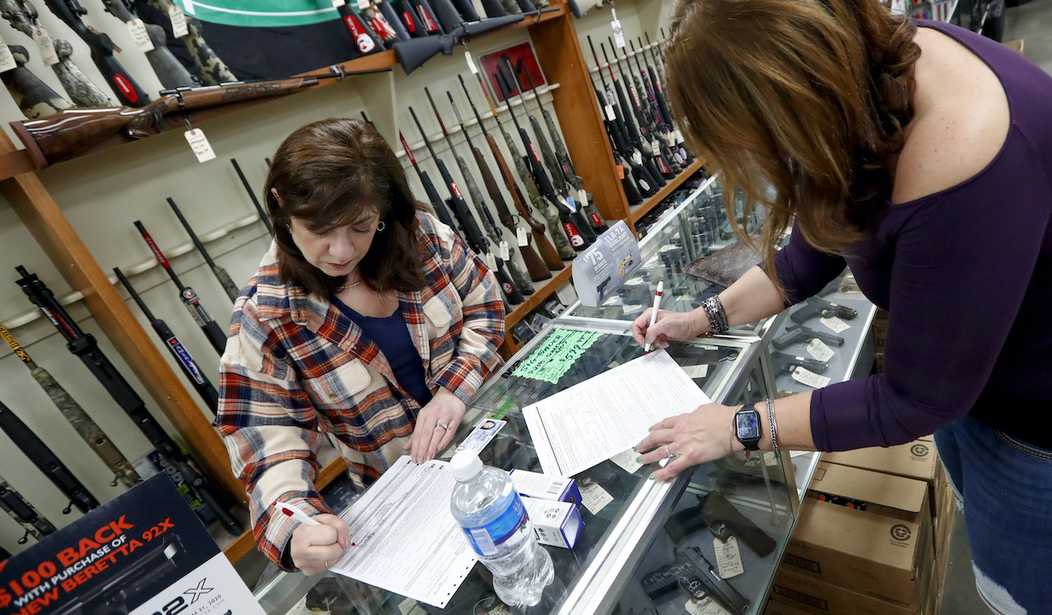If we possess a right to keep and bear firearms, it stands to reason that we must also have the right to acquire one, but according to a federal judge in Colorado no such right exists.
U.S. District Judge John L. Kane, an 86-year-old appointee of Jimmy Carter back in 1977, made the eyebrow-raising decision in a case known as Rocky Mountain Gun Owners v. Polis, which challenges Colorado’s newly-enacted three-day waiting period on all gun sales. Kane denied the group’s request for an injunction that would have halted enforcement of the waiting period while the litigation continues, ruling the plain text of the Second Amendment only covers the right to keep and bear a firearm, not to purchase or acquire one for lawful purposes.
Plaintiffs contend that the words “keep” and “bear” in the Second Amendment are implicated by the waiting period required by the Act. In Heller, the Supreme Court examined the “normal meaning” of those words at the time of the Nation’s founding, reviewing definitions from contemporaneous dictionaries. As the Court explained, the 1773 edition of Samuel Johnson’s Dictionary of the English Language “defined ‘keep’ as, most relevantly, ‘[t]o retain; not to lose,’ and ‘[t]o have in custody.’”
Plaintiffs contend that the words “keep” and “bear” in the Second Amendment are implicated by the waiting period required by the Act. In Heller, the Supreme Court examined the “normal meaning” of those words at the time of the Nation’s founding, reviewing definitions from contemporaneous dictionaries. As the Court explained, the 1773 edition of Samuel Johnson’s Dictionary of the English Language “defined ‘keep’ as, most relevantly, ‘[t]o retain; not to lose,’ and ‘[t]o have in custody.’” . The Court then turned to the word “bear” and determined that it means to “carry.” The Court clarified that, when “bear” is “used with ‘arms,’ however, the term has a meaning that refers to carrying for a particular purpose—confrontation.” So, putting all the pieces together, the Court found that the text of the Second Amendment “guarantee[s] the individual right to possess and carry weapons in case of confrontation.”
From this reading of the plain text, it is clear the relevant conduct impacted by the waiting period—the receipt of a paid-for firearm without delay—is not covered. Still, Plaintiffs attempt to equate the words “obtain” and “possess.” But these terms are not equivalent. To “keep,” under the definitions provided in Heller, meant to retain an object one already possessed. It did not mean to receive a newly paid-for item, and it certainly did not mean to receive that item without delay. Likewise, “hav[ing] weapons” indicates the weapons are already in one’s possession, not that one is receiving them.
So you have the right to possess a firearm but not the right to obtain one? Kane’s reasoning would leave the door open for all kinds of restrictions on the acquisition of arms. Why not a six-month waiting period? How about a $500 administrative fee for every firearm purchase, or mandating purchasers come up with a half dozen character references before a gun can be sold. Taken to its extreme, Kane’s position would leave open the possibility of a complete and total ban on gun sales. It’s ridiculous to separate the right to obtain a firearm with the right to keep and bear it, but that’s exactly what the judge did here.
Kane went on to say that even if commercial sales of firearms are protected by the Second Amendment’s language, Colorado’s waiting period is likely to withstand court scrutiny because there were no “Guns-R-Us” outlets at the time the Second Amendment was ratified. It could take days, weeks, or even months for a would-be gun owner to acquire a firearm while they waited for a shipment of muskets to be delivered to their nearest city or town. Of course, there was no law requiring people to wait before purchasing a firearm if one was readily available, nor were there any prohibitions on private transfers of arms. If your neighbor had a fowling piece that you wanted to purchase, you could walk or ride to his farm and make a trade or a cash transaction without the possibility of punishment from the state.
Further, says Kane, though there aren’t any statutes in the historical record that mirror Colorado’s modern waiting period, there are some old laws that he believes are a close enough analogue to allow the state’s three-day waiting period to pass muster; laws forbidding the carrying of firearms while intoxicated.
Perhaps the state could impose a more narrowly tailored requirement, but that is not the inquiry here. The intoxication laws prevented all individuals from becoming intoxicated and engaging in the prohibited conduct. They did not apply only to those people who would have certainly used a firearm irresponsibly while intoxicated. Despite Plaintiffs’ arguments, the “how” and the “why” of the intoxication laws and the Waiting-Period Act are sufficiently similar to demonstrate that the Act is consistent with the Nation’s historical tradition of firearm regulation.”
The purpose of the waiting period, according to Colorado’s legislature, is to “help prevent impulsive acts of firearm violence, including homicides and suicides.” According to Kane, because the ostensible reason for the waiting period is similar to the rationale on historical prohibitions against carrying while under the influence, that’s enough to make the two laws analogous. Of course, under that theory, virtually any gun control measure could be deemed a part of the historical tradition, so long as lawmakers contend that its purpose is to prevent “impulsive” acts of gun violence.
If the majority in Bruen believed that opinion would put a stop to the Second Amendment shenanigans in the lower courts, it should be clear to them by now that is most certainly not the case. We’ve seen judges declare that commonly owned arms like semi-automatic rifles are not protected by the Second Amendment, wide swathes of public spaces can be deemed “sensitive” and off-limits to lawful carry, and the right to keep and bear arms does not encompass the right to obtain one. Each of these decisions is a gross misreading of Bruen as well as a green light for fundamental infringement on our Second Amendment rights, but until SCOTUS intervenes these abuses will continue.









Join the conversation as a VIP Member